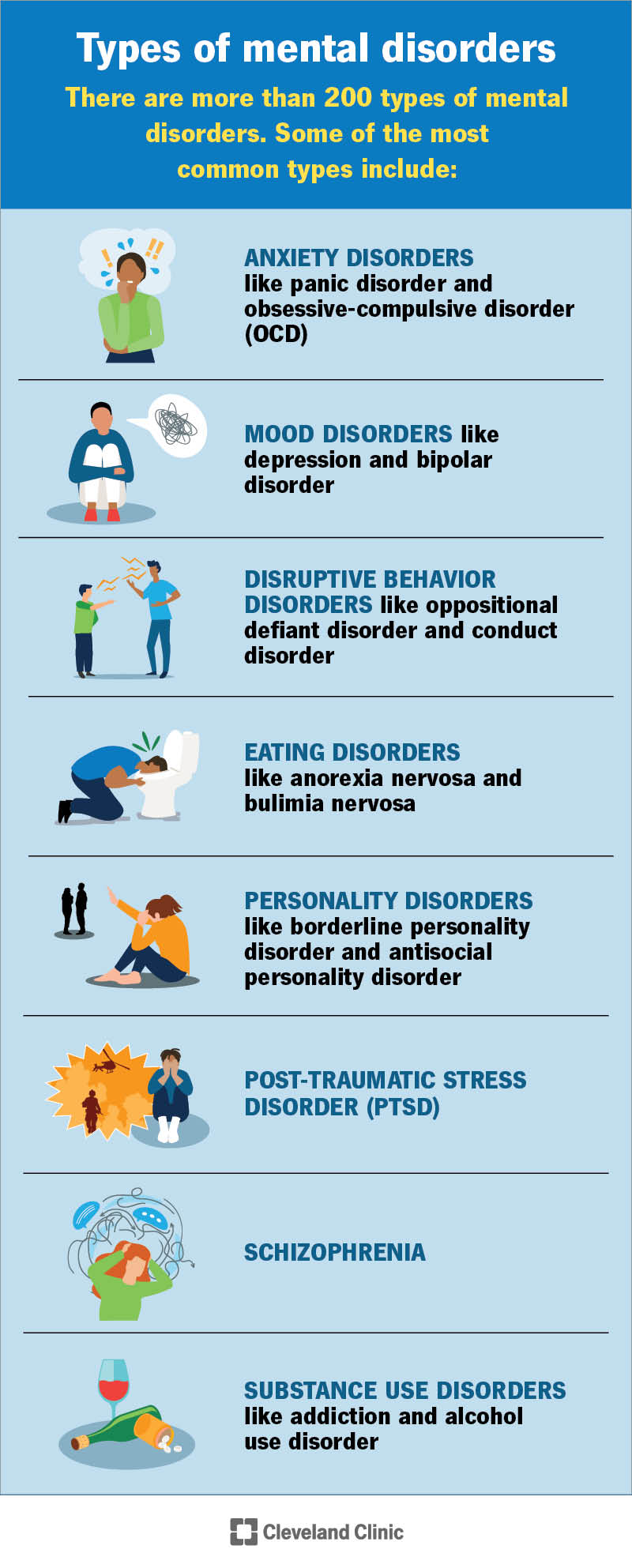Mental disorders are conditions that affect your thoughts, emotions and behavior. There are more than 200 types, like depression, anxiety and schizophrenia. You may have mood swings, appetite changes, hallucinations or loss of interest. Treatment, like therapy and medications, may help you manage symptoms.
Advertisement
Cleveland Clinic is a non-profit academic medical center. Advertising on our site helps support our mission. We do not endorse non-Cleveland Clinic products or services. Policy

Image content: This image is available to view online.
View image online (https://my.clevelandclinic.org/-/scassets/images/org/health/articles/mental-disorders)
A mental health disorder, also known as a mental illness or psychiatric disorder, is a condition that affects the way you think and behave. It also influences your emotions and how you regulate them. You may feel anxious or empty, have racing thoughts or have trouble eating or sleeping.
Advertisement
Cleveland Clinic is a non-profit academic medical center. Advertising on our site helps support our mission. We do not endorse non-Cleveland Clinic products or services. Policy
There are several different types. They may impact your ability to function at home, work or school.
Mental disorders are common. About 1 in every 8 people around the world lives with one of these disorders.
No matter what you’re feeling, help is available.
There are more than 200 types of mental health disorders. Some of the most common types include:
Mental health conditions can lead to a broad range of symptoms. These vary based on the type, but may include:
Advertisement
Mental disorders in children may affect how they think, feel and behave. You might notice that your child has:
A person doesn’t have to have all of these symptoms to receive a diagnosis. But, experiencing a few may be a sign to talk to a healthcare provider.
Many factors may contribute to the development of a psychiatric disorder. These could include:
Anyone can develop a mental disorder. Your risk increases if you:
Mental health disorders prevent you from feeling like yourself. These disorders may make you think about hurting yourself or others. You may also have thoughts about suicide.
If you’re ever in a difficult situation where these thoughts are flooding your mind, don’t hesitate to reach out for help. Call or text 988 (U.S.). This is the Suicide & Crisis Lifeline. Someone is available to speak with you 24/7. You don’t have to be in a crisis to talk.
To diagnose a mental health condition, your provider will start with a physical exam and a review of your medical history. They’ll also do a psychological evaluation. A psychologist will ask you questions about your thoughts, feelings and behaviors to better understand your symptoms.
Be sure to tell your provider:
Advertisement
It can be difficult to be open and honest with a provider. You may feel vulnerable sharing your personal feelings with someone else. This is normal. But understand that your provider wants to help you feel better. They won’t judge you for feeling the way that you do. Your honesty helps them make an accurate diagnosis and offer the best care possible.
There aren’t any medical tests that can diagnose mental disorders. But your provider may perform tests, like blood work or imaging tests, to rule out other conditions that may cause similar symptoms.
If you’re experiencing symptoms, a good first step is talking with a primary care physician. They may refer you to a psychologist or psychiatrist, depending on your needs. In some cases, a social worker can help. After a diagnosis, a mental health therapist or counselor is often the person you’ll see most regularly during therapy. There are different paths to an accurate diagnosis and effective treatment, and different providers can help you get there.
Treatments for mental disorders may include:
Advertisement
If you’re in crisis or your safety is at risk, you may need care in a hospital or outpatient treatment center. These programs provide immediate support. Your care team may also coordinate follow-up treatment to ensure continued progress after you leave.
See a healthcare provider if symptoms are making it hard to get through your day. They’ll help you understand what’s going on and find ways to reduce the impact on your daily life.
If you have a mental health disorder and you notice changes to the symptoms you experience, let your provider know.
If you’re in a crisis or need immediate help, contact 911 or your local emergency services number.
Treatment may help you feel better and make it easier to get through your day. It often takes time, and you may not feel better right away. But progress is possible. Your care team will work with you to create a personalized treatment plan based on your goals. You’ll be able to set your own pace and adjust your goals as your needs change.
Some conditions may improve over time, but others require long-term management. A healthcare provider can guide you through that process and help you adapt your treatment as needed.
Mental health conditions are common and nothing to be ashamed of. You might have one yourself or know someone who does. These disorders aren’t character flaws or signs of weakness. They can have many causes and are often more complex than they seem.
Advertisement
A healthcare provider can help you understand what’s going on and create a treatment plan that fits your life. With the right care and support, you can take meaningful steps toward feeling better and staying well.

Sign up for our Health Essentials emails for expert guidance on nutrition, fitness, sleep, skin care and more.
Learn more about the Health Library and our editorial process.
Cleveland Clinic’s health articles are based on evidence-backed information and review by medical professionals to ensure accuracy, reliability and up-to-date clinical standards.
Cleveland Clinic’s health articles are based on evidence-backed information and review by medical professionals to ensure accuracy, reliability and up-to-date clinical standards.
Your mental well-being is just as important as your physical well-being. Cleveland Clinic’s mental health experts can help you live life to the fullest.
